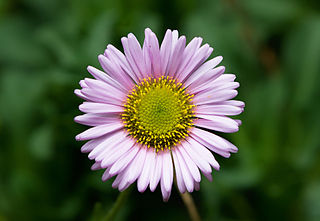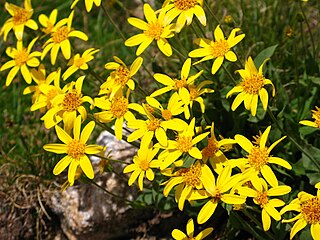
Erigeron is a large genus of plants in the composite family (Asteraceae). It is placed in the tribe Astereae and is closely related to the Old World asters (Aster) and the true daisies (Bellis). The genus has a cosmopolitan distribution, and the highest diversity occurs in North America.

Erigeron divergens is a species of flowering plant in the family Asteraceae known by the common name spreading fleabane. It is native to western North America.

Ericameria bloomeri, known by the common names Bloomer's rabbitbush and Bloomer's goldenbush, is a species of flowering shrub in the family Asteraceae. This plant is native to the mountains of western North America from British Columbia to California, including Washington, Oregon, Idaho, and Nevada. It may have been extirpated from Canada.

Erigeron elegantulus is a North American species of flowering plants in the family Asteraceae known by the common names blue dwarf fleabane and volcanic daisy.

Erigeron glaucus is a species of flowering plant in the family Asteraceae known by the common name seaside fleabane, beach aster, or seaside daisy. It is native to the West Coast of the United States.

Chaenactis suffrutescens is a species of flowering plant in the aster family known by the common name Shasta chaenactis.

Packera greenei is a species of flowering plant in the aster family known by the common name flame ragwort. It is endemic to northern California, where it is known from the North Coast Ranges and southern Klamath Mountains. It is a resident of dry mountain scrub habitat, often on serpentine soils.

Packera werneriifolia, known by the common names alpine rock butterweed and hoary groundsel, is a species of flowering plant in the aster family. It is native to the western United States in the Sierra Nevada mountain habitat in subalpine and alpine climates, including forests and barren talus.

Erigeron lonchophyllus is an Asian and North American species of flowering plant in the family Asteraceae known by the common name shortray fleabane.

Erigeron maniopotamicus is a rare species of flowering plant in the family Asteraceae known by the common name Mad River fleabane. It is endemic to northwestern California, where it is known from only four locations in Humboldt and Trinity Counties.

Erigeron rhizomatus is a rare species of flowering plant in the family Asteraceae known by the common names Zuni fleabane and rhizome fleabane. It is native to western New Mexico and eastern Arizona in the United States. It is a federally listed threatened species.

Packera franciscana is a rare species of flowering plant in the aster family known by the common name San Francisco Peaks groundsel, or San Francisco Peaks ragwort. It is endemic to Arizona in the United States, where it is known only from the San Francisco Peaks in Coconino County. It is threatened by recreational activities in its habitat. It is a federally listed threatened species of the United States.
Packera castoreus is a rare species of flowering plant in the aster family known by the common names Beaver Mountain groundsel and Beaver Mountain ragwort. It is endemic to Utah in the United States, where it occurs only in the Tushar Mountains.

Veratrum hybridum is a species of flowering plant in the Melanthiaceae known by the common names slender bunchflower and crisped bunchflower. Many publications use the synonyms Melanthium latifolium and Veratrum latifolium, but the "hybridum" epithet is 9 years older than the "latifolium," so Veratrum hybridum is now the accepted name.

Potentilla hippiana is a species of flowering plant in the rose family known by the common names woolly cinquefoil, horse cinquefoil, and Hipp's cinquefoil. It is native to North America, where it occurs in western Canada and the western United States. It occurs in eastern Canada and the US state of Michigan as an introduced species.

Xanthisma coloradoense is a species of flowering plant in the family Asteraceae known by the common name Colorado tansyaster. It is native to Colorado and Wyoming in the United States.

Symphyotrichum georgianum is a rare species of flowering plant in the Asteraceae, the aster family. Its common name is Georgia aster. It is native to the southeastern United States where it is known from Alabama, Florida, Georgia, North Carolina, and South Carolina. As of 2013, it may be extirpated from the state of Florida.

Erigeron leiomerus is a rare species of flowering plant in the family Asteraceae known by the common names rockslide yellow fleabane or rockslide fleabane. It is native to the western United States, primarily in the Rocky Mountains and the Great Basin. It has been found in Montana, Idaho, Nevada, Utah, Wyoming, Colorado, and New Mexico.

Erigeron radicatus is a North American species of flowering plant in the family Asteraceae known by the common names Hooker's fleabane and taproot fleabane The species grows in central Canada and parts of the north-central United States, primarily the northern Rocky Mountains and the Black Hills. It has been found in Idaho, Montana, Utah, Wyoming, Colorado, Nebraska, and South Dakota, with a few isolated populations reported from North Dakota.

Symphyotrichum molle is a species of flowering plant in the aster family (Asteraceae) endemic to the Bighorn Mountains of Montana and Wyoming in the United States. Commonly known as soft aster, it is a perennial, herbaceous plant that ranges from 30 to 60 centimeters in height.



















